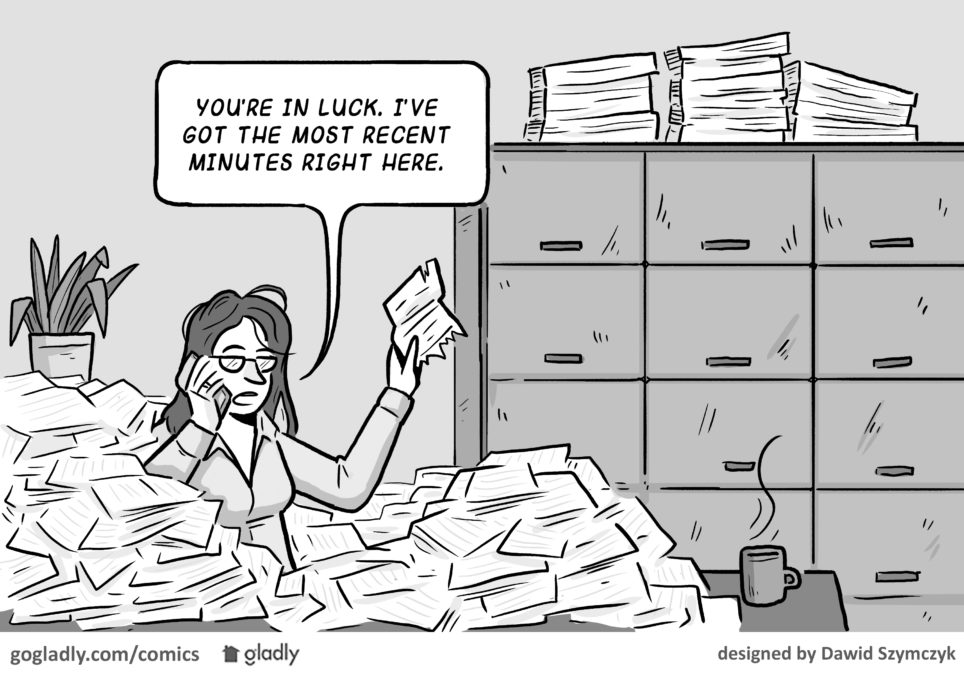As an HOA Manager, you’re probably aware of the importance of keeping proper records. Thorough records are imperative, not only in the case of legal challenges, but also for simple documentation and memory purposes.
Memory Isn’t Enough
Let’s say a homeowner repeatedly violates a certain rule, or wasn’t aware of a change made by the board. Meeting minutes that document board motions and decisions on that issue would eliminate the issue of, “your word against mine.”
Besides that, HOA managers and board members are all human beings, with limited capacity to remember stuff. What the heck did we decide about the flowers out front? What pool maintenance company did we pick? Keeping good records can answer all those questions, so you don’t have to keep it all in your magnificent brain.
And if you ever do get sued, here’s a newsflash: your recollection, no matter how brilliant you are, won’t hold up in court. However, meeting minutes documenting motions and the decisions that are made will hold up (as long as they’re organized enough that you can find what you need).
Don’t Document the Drama
Another word about meeting minutes. In many circumstances outside HOA meetings, detailed notes can be helpful. But when it comes to the HOA, having too many details is not only unnecessary, but can actually get you into trouble. In legal matters, all you need to keep track of is official actions: what was motioned (doesn’t matter by whom) and what was decided. Legally, that’s what matters. Writing down people’s conversations could actually give opposing legal teams more ammo to use against you, opening up a proverbial can of worms. Detail overkill actually becomes a big problem for a lot of HOAs. So remember, meeting minutes do matter, but for official actions only. When in doubt, follow this advice.
When setting up your record keeping system and discussing how records should be kept, it’s always best to consult an attorney with HOA expertise. He or she should be familiar with local laws that dictate what records need to be kept, and for how long.
HOA Record Keeping That Works
Maybe you’re a new HOA. Perhaps you’ve been around a while but are just getting record-keeping policies settled. Either way, here some things to consider to ensure your system serves you well day to day.
Who’s On First?
And by that, we mean who’s got the first responsibility for generating and storing HOA records? Is it the manager? Do you have a specific records officer on your board? Will you hire it out to an attorney or other professional you can trust?
No matter who’s in charge, remember that your records could make or break you in the event of legal action. So be sure that person is willing, able, and qualified to stay on top of it.
What’s a Record, Anyway?
You’d probably agree that — properly done — meeting minutes should always be official records. But what else should receive that distinctive title? You might consider keeping bids from contractors (along with notes), so you have a list of potential go-to providers. You also may want to keep invoices on any work performed. Proposed amendments might be official records, as could homeowner requests for accommodations.
Who Needs Access?
You’ll need to determine who legally has access to records at all times or upon request. Local laws will help you make many of those decisions, but there could be other things to consider as matters of internal policy. For example, what’s the procedure when information requests are received, and how are requests submitted? And then, who holds the keys to the records vault? Above all, talk to your attorney when creating records access policies so you know your legal bases are covered.
Where Do You Put All This Stuff?
How records are stored will have pretty big implications on accessible they are. Are you going to use Google docs or other online storage options? How will access be secured to certain people? How will those electronic records be backed up? If hard copies are to be kept, where should they be stored?
For your documentation to do you any good, it has to be accessible and easy to search. There are a lot of options available for electronic document storage that should make this fairly easy. The most important thing is to make sure your storage doesn’t become fragmented. You don’t want some records kept in one place, and others kept elsewhere.
However you choose to store your HOA records, do so with an eye to simplicity. The more cumbersome it is to keep records, the less likely it is to happen.
As a Matter of Policy, Document the Policy
Yeah, it sounds like a pain. But just like decisions need to be documented in meeting minutes, your protocols for record keeping need to be laid out in black and white. Otherwise, you can’t really expect them to be followed accurately and consistently.
Again, consult your HOA attorney for help with local laws that affect record keeping. Their advice will form the framework on which to build and document your policies. Then in the case of questions — and there will be questions — you’ve got all your i’s dotted and t’s crossed.
- Walking the “Fine Line”: Imposing Fines in Your HOA - July 31, 2019
- HOA Meetings That Don’t Stink - January 23, 2019
- Setting Up Your HOA Record Keeping System - November 28, 2018



 Help
Help
Great article on a very common problem that could be so easily resolved by any of many new technologies.